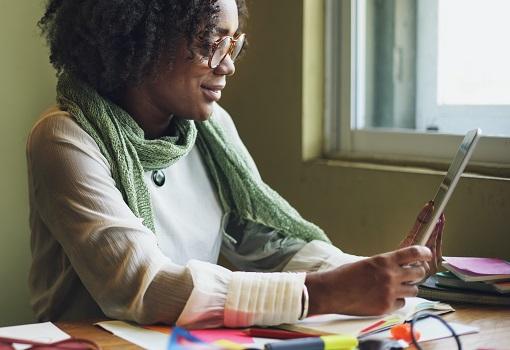
 |
By Tom Burnett, Policy and Information Officer, Voscur |
Although a digital divide existed in the UK well before the coronavirus pandemic, how digital exclusion compounds existing inequalities has really come to the fore over the past 12 months.
Stress levels aside, many households have had sufficient access to technology and broadband for children and adults to learn and work at home. However, many have not been as lucky, as a lack of devices and expensive broadband have made the combination of home schooling and home working (or finding out health information or applying for benefits online) next to impossible.
At the start of the third lockdown, Ofcom estimated that up to 1.8 million school children in the UK had no access to a tablet, laptop or desktop computer. Locally, research undertaken by Knowle West Media Centre found that 47% of children in the 300 families surveyed did not have the right access to do their schoolwork, so were likely to fall behind their peers. Research by Black South West Network (BSWN), Voscur and Locality found that, after mental health, digital exclusion was the biggest lockdown concern.
Are things improving?
While the need for better access to tech and broadband was recognised from the start of the first lockdown, government and the big broadband firms have been slow in responding to need. Indeed, the government’s promise of a million laptops and tablets looks as though it won’t be fully in place until the end of this academic year.
Much local provision has been organised by schools, as their calls for unused equipment from their communities went some way towards plugging the gaps. There have also been responses such as Project Reboot, a device redistribution programme that links business, community groups and schools.
Local businesses and charities have also worked together to improve circumstances for families. In Bristol, DigiLocal has provided a pipeline for community and corporate donations of laptops which are then distributed through a network of charities and providers.
Bristol City Council (BCC) is in the process of recycling and repurposing 3,600 laptops, which includes cleaning, loading Windows 10 packages on all devices and free tutorials. BCC’s focus is on young people not in education, employment or training; vulnerable adults, including adults with learning difficulties; parents with two-year-olds in the most deprived areas; adults who cannot access or do not have the means to have equipment; unemployed who cannot access learning work; socially isolated adults; and the elderly.
While this is all great news, is it too little, too late?
How can we learn from the past 12 months?
While some have benefited from donated laptops and cheaper or free wifi, the pandemic has highlighted a number of issues:
The need for a more joined up approach is recognised by Bristol City Council and improved connectivity, including access to ICT, is part of the city council’s One City programme. The council’s newly-formed One City Digital Board, which includes Voscur, will investigate all areas of digital inclusion, from hardware (equipment) to software, safeguarding to connectivity.
As BSWN reported: “Bristol City Council and other councils have the voice and can really influence this work going forward, helping and shaping the communities experiencing different levels of digital need.”
In February, Voscur facilitated a meeting of over 30 community organisations, city partners and stakeholders who are working to address these issues. Attendees were in agreement that the level of digital exclusion felt locally means that action is needed now, across all sectors and communities in Bristol. Voscur will work with the One City Digital Board and other local partners to identify solutions as part of the sector’s recovery strategy.
We will keep you updated on progress but, in the meantime, we are keen to hear from you and your community on this issue.
If so, please email esther@voscur.org.